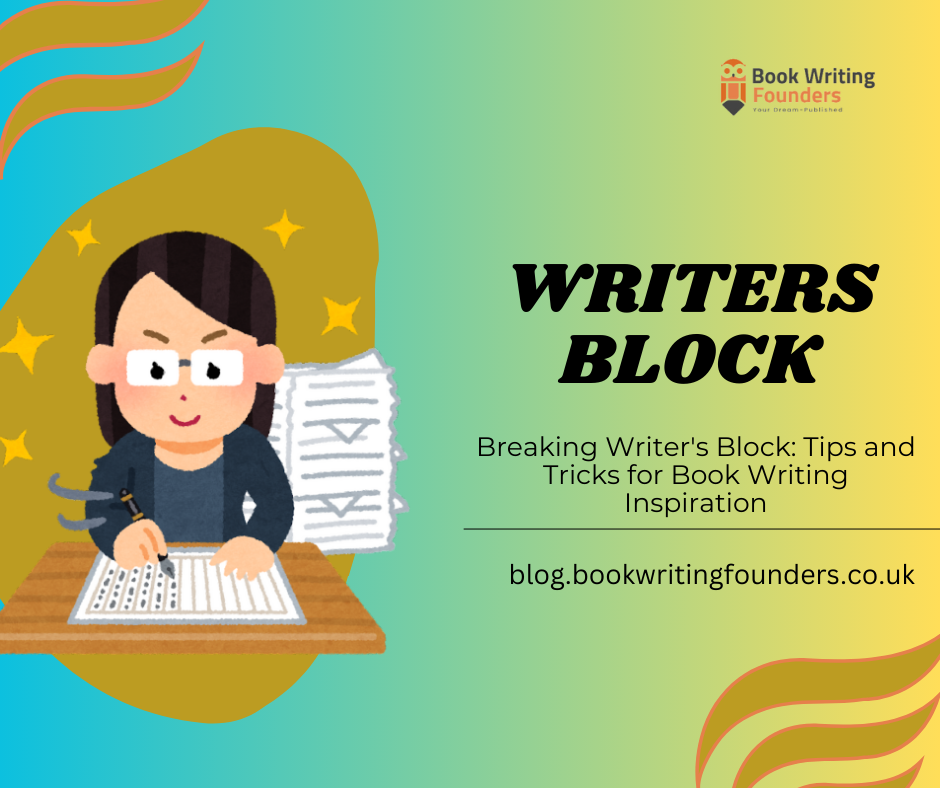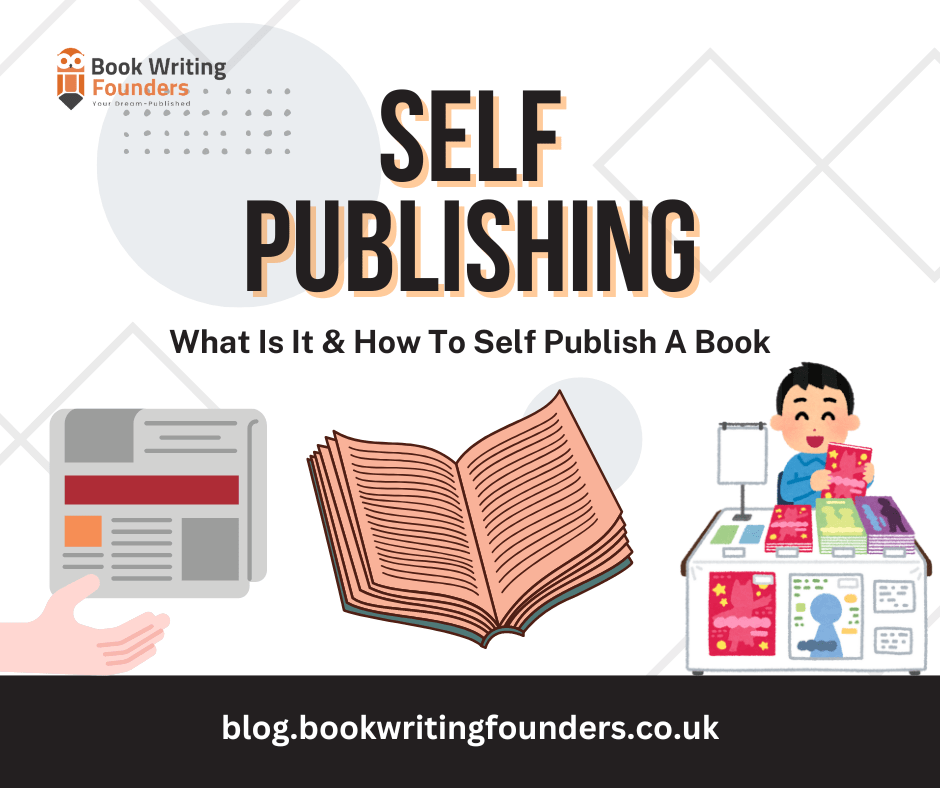
Book
Introduction
Everyone who writes, from beginners to seasoned pros, has had the frustrating experience of figuring out how to get past writer’s block. When writing, you might have these philosophical times of dread where your mind becomes confused as you stare at a blank page.
A few things, both internal and exterior, can get in the way. Maybe you tried to get your book published but were turned down, you don’t have enough time, or other stressful things are happening.
It’s also possible that you are stressed out about the writing process. One way to deal with it is to learn and implement it practically to avoid facing the situation again.
Finding Your Creative Flow: Overcoming Writer’s Block in Book Writing
Book Writing Founders UK has conducted research and compiled a comprehensive set of tips to help overcome writer’s block:
Setting a Daily Writing Goal
The importance of setting daily writing goals cannot be overstated. Begin with modest targets, aiming for a specific number of words or a set amount of time dedicated to writing each day.
This approach breaks the larger, more intimidating task of completing a novel or manuscript into manageable pieces, making the process seem less daunting. Consistency in meeting these daily goals keeps the momentum of your project going, even on days when inspiration seems to wane.
Establishing a Routine
Identifying and adhering to a writing routine can significantly overcome writer’s block and enhance productivity and creativity. Everyone has certain times of the day when they feel most creative and focused.
Determine your peak creative periods—early morning, late at night, or somewhere between—and schedule your writing sessions accordingly. The consistency of a routine can train your brain to be in ‘writing mode’ at these times, making it easier to start each session.
Changing Your Environment
A change of scenery can do wonders for your creativity. If stuck in a rut, consider writing in a new location. This could be as simple as moving from your home office to a local coffee shop, library, or park. Different environments stimulate your senses in varied ways, potentially sparking new ideas and offering fresh perspectives on your work.
Leveraging Writing Prompts
Writing prompts are an excellent tool for overcoming writer’s block. They provide a starting point from which your imagination can take off, leading you down paths you might not have explored otherwise. Whether it’s a single word, a sentence, or a scenario, writing prompts challenge you to think creatively and write something outside of your current project’s scope.
Reading Broadly
Reading is fuel for writing. You can find inspiration in the most unexpected places by exposing yourself to a wide range of genres and styles. Reading outside your comfort zone can introduce you to new ideas, narrative structures, and ways of expressing thought that can rejuvenate your writing.
Additionally, reading critically can help you understand what works (and what doesn’t) in writing, which you can then apply to your work.
Practicing Freewriting
Freewriting is a technique where you write continuously for a set period without worrying about grammar, spelling, or even coherence. The goal is to let your thoughts flow freely and start writing book that comes to mind without self-censorship. This can help you bypass the inner critic that often contributes to writer’s block, allowing you to access your subconscious and uncover new ideas.
Taking Regular Breaks
While it might seem counterintuitive, taking regular breaks is essential for maintaining creativity and productivity. Long periods of continuous writing can lead to mental fatigue, making writer’s block even more likely. Breaks provide an opportunity to rest and recharge, often resulting in new insights and ideas once you return to your work.
Connecting with Other Writers
Writing can be a solitary activity, but that doesn’t mean you have to face writer’s block alone. Connecting with other writers through writing groups, online forums, or social media can provide support, motivation, and fresh ideas. Sharing your struggles and successes with peers who understand what you’re going through can be incredibly encouraging.
Utilizing Writing Software
A plethora of writing software and tools is available to help organize your thoughts and streamline the writing process. From apps designed to help with plotting and character development to software that blocks distractions, technology can be a valuable ally in your fight against writer’s block.
Embracing Imperfection
One of the biggest hurdles to overcome when facing writer’s block is the pressure to write perfectly. It’s important to remember that the first draft is not the final product. Allowing yourself to write poorly, to make mistakes, and to explore ideas without judgment can free you from the paralysis of perfectionism. Editing and refining come later—the priority is to get the words down.
Setting Deadlines
Self-imposed deadlines can create a sense of urgency and focus. By breaking your project into smaller tasks and setting deadlines for each, you can build a roadmap to completion that feels achievable. Deadlines can motivate you to push through moments of stagnation and keep you accountable for your writing goals.
Rewarding Yourself
Incorporating rewards into your writing process can be a powerful motivator. Establish rewards for reaching certain milestones, such as completing a chapter or hitting a word count goal.
These rewards don’t have to be extravagant; they can be as simple as treating yourself to your favorite coffee, relaxing bath, or binge-watching a new TV series. The anticipation of a reward can provide that extra push you need to meet your writing goals.
Limiting Distractions
In today’s digital age, distractions are only a click away. Social media, emails, and the endless allure of the internet can derail your writing sessions before they even begin. Following a writing guide, creating a distraction-free writing environment is crucial.
This might mean writing in a quiet room, using apps that block distracting websites, or turning off your phone. By minimizing distractions, you maximize your focus and productivity, making it easier to overcome writer’s block.
Mind Mapping Your Ideas
Mind mapping is a visual brainstorming technique that can help you organize your thoughts, plot lines, and character relationships more intuitively and creatively. You can see how different parts of your story fit together, find holes in your story, and develop new ideas by drawing out your ideas.
This method can be particularly useful when you’re stuck on a plot point or need inspiration for character development.
Attending Workshops or Classes
Participating in writing workshops or classes can provide new insights and techniques to enhance your writing. These settings offer not only the expertise of instructors but also the opportunity to receive feedback from fellow writers. Exposure to different professional editing services can help refine your writing and inspire new approaches to storytelling.
Using the Five Senses
When you’re stuck, try diving deeper into the sensory experiences of your scenes. Describing a setting, character, or event using all five senses can add richness and depth to your writing. This exercise helps create more vivid descriptions and can spark ideas for plot developments or character interactions based on sensory experiences.
Exploring Your Characters
Sometimes, writer’s block stems from not knowing your characters well enough. Explore your characters’ backgrounds, motivations, fears, and desires. Writing character sketches or journal entries from your characters’ perspectives can provide insights into how they would react in certain situations, opening up new avenues for your narrative.
Keeping a Journal
Maintaining a daily journal allows you to capture snippets of dialogue, descriptions, observations, and personal reflections that can serve as fodder for your creative work. Real-life experiences, success stories, and emotions can enrich your writing, providing authenticity to your characters and settings. Additionally, journaling can be a therapeutic practice to clear your mind and overcome barriers to creativity.
Listening to Music
Music can be a powerful tool to evoke emotions and set the tone for your writing sessions. Creating playlists that match the mood of your project can help immerse you in the world you’re creating.
Music can provide the emotional cue to get your creative juices flowing, whether it’s the adrenaline rush of an action-packed scene or the melancholic atmosphere of a poignant moment.
Trusting the Process
Finally, it’s important to remember that writer’s block is a normal creative process. Every writer, regardless of experience, faces moments of doubt and stagnation. The key is not to let these moments discourage you but to recognize them as opportunities for growth.
Trust in your abilities and the process of writing. With persistence, patience, and the strategies outlined above, you will navigate through the challenges of writer’s block and emerge with your creativity renewed and your project advanced.
Conclusion:
Overcoming writer’s block requires a combination of practical strategies, mindset shifts, and a willingness to explore new techniques. Setting realistic goals, embracing imperfection, and staying connected with the wider writing community allows you to keep the words flowing and maintain your passion for writing.
Every writer’s journey is unique; what works for one person may not work for another. Experiment with different approaches to find what best suits you and your writing style. With dedication and resilience, you can overcome any obstacle and continue to create compelling, engaging stories.


![How to Hire Children’s Book Publishers UK [2023 Guide]](https://blog.bookwritingfounders.co.uk/wp-content/uploads/2023/05/How-to-Hire-Childrens-Book-Publishers-UK-2023-Guide-min.png)


